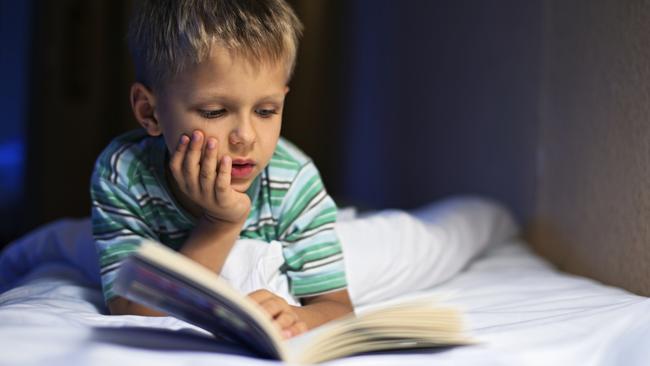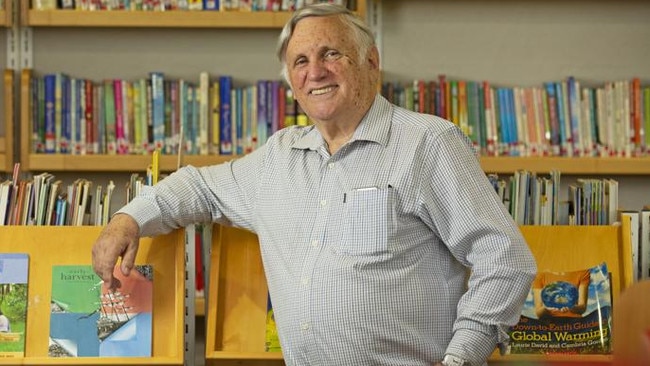Bullied kids don’t need to change a thing, John Marsden
For so many children in need, books offer an escape the schoolyard can’t. But when one of Australia’s most celebrated authors tells those same kids they’re the problem, something has gone seriously wrong, writes Frances Whiting.
Rendezview
Don't miss out on the headlines from Rendezview. Followed categories will be added to My News.
For some of us, books are the balm of life.
Books can take us to from where we don’t want to be to where we would much rather be.
Go into any library, but particularly a school library, at lunchtime and you will find those who have sought, and found, steady refuge within its shelves.
Of course books bring us joy too, great dollops of laughter and whoops of delight, but for me, the most important job books do is to open up a world outside of the one we live in.
For the fortunate among us, that is an adventure, for the vulnerable, it is a life saver.
For a book lover, meeting an author whose words have pierced our skin is akin to a cricket tragic running into Virat Kohli at the shops, or a fan girl meeting Taylor Swift.
Decades ago I met Clive James at a party and found no words to explain how I (then, as now) howled with laughter every time I thought of his chapter “The Man in the Brown Paper Bag” in his memoir Falling Towards England. Instead I stood mute, silently blinking at him until he walked away.
MORE FROM FRANCES WHITING: The two words I don’t want to hear when school is back
All of which is to say that some writers — whether they wish to or not — have a certain kind of power over their readers, and perhaps none more so than children’s’ or young adult authors.
Witness the hysteria caused by an appearance of Andy Griffiths and Terry Denton of the 7 Storey Treehouse series. Watch a school roll out it red carpet when Mem Fox comes to town. Read young adult author’s John Greene’s website comments page. It’s apparent that to their readers, these peoples words count.
Which is why Australian author John Marsden’s (the wonderful Tomorrow When the World Began series, So Much to Tell You) recent words on bullying have caused considerable consternation.

Specifically, these words.
“A lot of the so-called bullying in schools is just kids giving each other feedback … it’s rare for a child who’s got likeable qualities to be treated in some sort of horrific or bullying way. Usually there is a range on behaviours which have caused friction to develop.”
Marsden continued, “Look at your own likeable and unlikeable behaviours and try to reduce the list of unlikeable behaviours and unlikeable values and unlikeable attitudes, and over time that will probably have a significant effect”.
Marsden’s remarks came after the release of his new book The Art of Growing, in which the author, teacher and school manager (he runs two north of Melbourne) critiques the education system. And it’s got some really good stuff in it.
But not this stuff.
MORE FROM FRANCES WHITING: Greed and profit have no place at a baby’s grave
This stuff takes us back to the days when bullying was somehow considered the person being bullied’s responsibility.
When we expected them to fix it. When we would tell kids to ignore it, or to walk into the playground with their head held high, or to use humour, or to “just ignore it” and it will go away. Only it didn’t and it doesn’t.
This much I know as a former teacher back in those days who told children that mostly useless advice myself.

I know it, too, from my long time association with the Kids Help Line.
I know a few other things from those experiences, which I’d like to share here with you if you are a parent of a child who is being bullied, or a friend, or if you are that child.
Of course there are exceptions to many rules, but generally I have found that the kids who are most likely to be bullied are the kind ones. And to those kids I’d like to say this:
It’s not your fault.
It’s not your responsibility to fix.
There is not “something wrong” with you.
You don’t have to examine your “likability” quotient.
You don’t have to change yourself.
You don’t have to change a thing.
You don’t have to stop being yourself in order to blend in.
MORE FROM FRANCES WHITING: Good riddance to the sexist school skirt
This is hard. And it will continue to be hard. But you will get through, as so many before you have gotten through.
One day, although it might seem a very, very long way off, you will know that you are enough, and you always were.
And if all else fails, go to the library and let it put its arms around you.
Frances Whiting is a journalist with The Courier-Mail and The Sunday Mail


